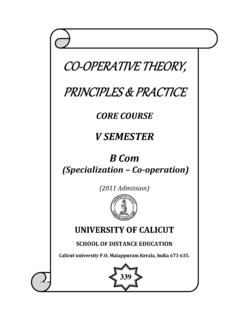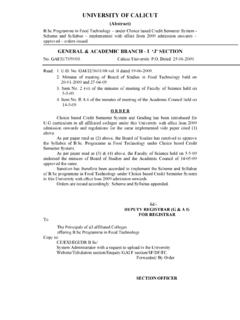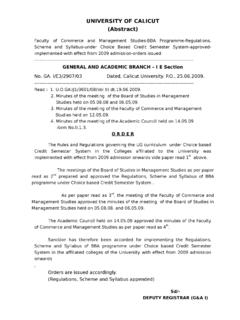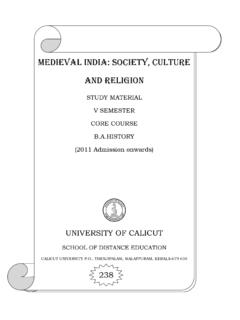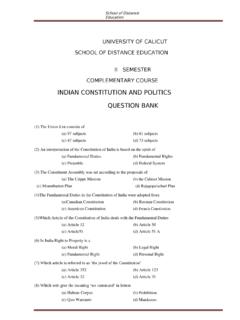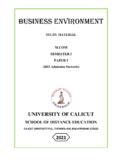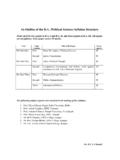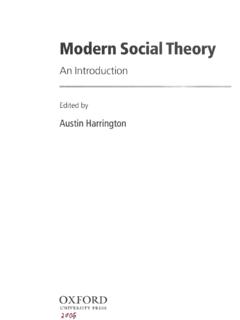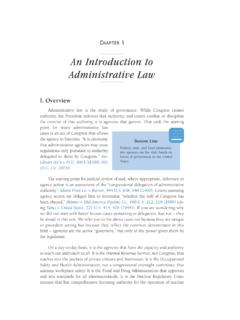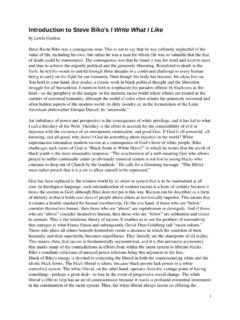Transcription of School of Distance Education
1 BAECONOMICSHISTORY OF ECONOMIC thought (VSEMESTER)CORE COURSE(2011 ADMISSION ONWARDS)UNIVERSITY OF CALICUTSCHOOL OF Distance EDUCATIONC alicut University, Malappuram,Kerala, India-673 635269 School of Distance EducationHistory of Economic Thought2 UNIVERSITY OF CALICUTSCHOOL OF Distance (2011 ADMISSIONONWARDS)VSEMESTER CORE COURSE:HISTORY OF ECONOMIC THOUGHTP reparedby:Module I II & Chacko JoseAssociate professor,Sacred Heart College ChalakkudyThrissur IV & VDr. K. RajanAssociate Professor, College, C. Krishnan,Associate Professor,Government College KodancheryKozhikode & Settings.
2 Computer Section, SDE ReservedSchool of Distance EducationHistory of Economic Thought3 CONTENTSPAGESMODULE-I5-42 MODULE-II43-113 MODULE-III114-161 MODULE-IV162-174 MODULE-V175-199 School of Distance EducationHistory of Economic Thought4 School of Distance EducationHistory of Economic Thought5 Module IIntroduction and Early Economic History of Economic ThoughtThe subject, the History of Economic thought , may be defined as a critical account of thedevelopment of economic ideas, searching into their origins, interrelations, and, in some cases, theirresults.
3 The history of economic thought concerns thinkers and theories in the field of political economyand economics from the ancient world right up to the present day. Economics was not considered aseparate discipline until the nineteenth century. For example, Aristotle, the ancient Greek philosopher,in his works on politics and ethics have thought of art of wealth acquisition . He alsoconsidered thequestion whether property is best left in private or public hands. In medieval times, scholars like ThomasAquinas argued that it was a moral obligation of businesses to sell goods at a just price.
4 Economicthought evolved through feudalismin the Middle Ages to mercantilist theory during the Renaissance(when people were concerned to orient trade policy to further the national interest). The modernpolitical economy of Adam Smith appeared during the industrial revolution, when technologicaladvancement, global exploration, and material opulence that had previously been unimaginable wasbecoming a reality. All these and further developments are subject matter of history of in economic thought have always accompanied changes in the economy, just aschanges in economic thought can propel change in economic policy.
5 Economic thought has at timesfocused on the aspects of human nature such as greed and selfishness that generally work against thegood of all; at other times,economic behaviour has been seen as self-regulating and working toward acommon purpose. As contemporary economic thought deals with the issues of globalization and theemergence of a global economy, economists have turned to the multitude of other disciplines which, likeeconomics, developed independently. Building on their discoveries, and united with them in pursuit ofthe common goal of benefiting human society, economic thought may be on the road to achieving a newlevel of are several ways to present the history of economic thought .
6 (i) to analyse the changingnature of economic theory in conjunction with the social and economic development of society (ii) toemphasize economic thinking as part of the main currents of philosophical and political ideas (iii) toemphasize the internal dynamics of the science where new insights and results emerge as aconsequence of economists awareness of the shortcomings of the present state of the Economic HistoryEconomic history is different from history of economic thought .
7 Economic history is the study ofthe economic aspects of societies in the past; the history of the economic use of resources land, labourand capital; or the examination of the past performance of is concerned with how peoplelived most of their lives, how many were born and died, how they earned and spent, worked and variants, however, reveal little more than the definition which once said simply that it was the sortof history which required a knowledge of economics; though they are an advance on that which definedan economic historian as one who wrote as little history as possible for as much money as of Distance EducationHistory of Economic Thought6 Economic history asks economic questions be they about the demand and supply of goods andservices, about costs of production, levels of income, the distribution of wealth, the volume anddirection of investment.
8 Or the structure of overseas trade it inevitably deals with large numbers, withaggregates. A study of economic history is important because the historical economic phenomena to beexamined in any given period have no existence independent of the social, political, cultural, religiousand physical environment in which they Why study History of Economic ThoughtThe economic process that evolves in any society is a complex matrix of individuals,organizations, rules, and relationships.
9 This matrix is the product of perceptions, values, beliefs,knowledge and technology. The economic process is embedded in society and is related to all aspects ofthe culture. An understanding of the economic system and economic theory requires an awareness ofthe social, historical and philosophical context in which they are developed. It is possible to trainindividual economists to apply economic tools, such as benefit/cost analysis without an understandingthe historical and philosophical context of the tools.
10 It is also possible to train an individual to fire andclean a firearm without considering the context of its alternative uses. This is the difference betweentraining and Education , between knowledge and wisdom. Both are history of economic thought is a study of alternative perspectives and explanations of howthe economic processes function. Animportant aspect of the study of economic thought is to identifythe factors that encourage different perspectives of the economy.
